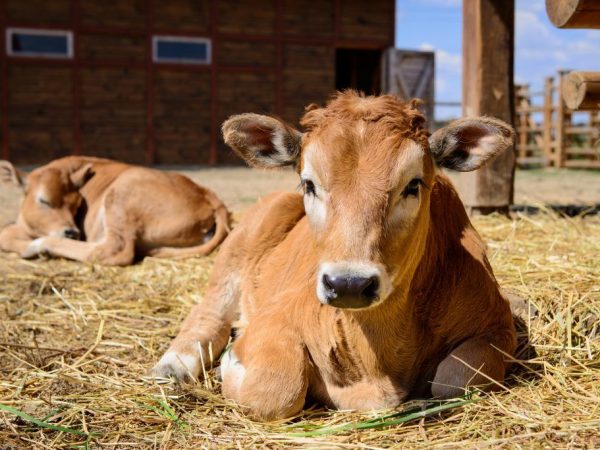The importance of vitamins in the life of calves
Only mother's milk can provide adequate nutrition for a newborn calf, at first this is enough. However, as the newly-minted pet grows up, it has to be transferred to another feed, then the owner has an involuntary question: how to enrich the diet? Nowadays, many different complexes have been developed, the main task of which is to provide the animal with all the necessary vitamins, micro- and macroelements. Let's try to figure out which vitamins calves need the most and how much of them the animal needs, depending on its age.

Calf vitamins for fast growth
What is useful for a growing body
Interestingly, proper storage of hay allows you to get from it vitamins A and D, which are essential for calves. In addition, these additives are of natural origin. A balanced diet of young calves is not complete without these 2 vitamins, they provide young calves with conditions for rapid development. Why is that? Vitamin A not only accelerates the growth of animals, but also strengthens the immune system, which means that it protects the calves from disease.
The amount of vitamin D in clover and alfalfa is sufficient to help fight rickets. Only high quality feed should be used. This can be achieved by drying the hay both under a canopy and in the sun. So different useful substances will be preserved in them. Then, before giving, the two types of hay are mixed. In addition, it is recommended to add cone infusion to the calf's food. This method will also replenish the growing body with important growth vitamins.
Important aspects of nutrition
Avitaminosis arises precisely from the lack of essential vitamins for calves. First of all, it is required to change the nutrition of the livestock to a more balanced one. Alternation of hay, silage, vegetables and concentrates can be applied. You need to start doing this as early as possible. So the body will receive natural vitamins that help rapid growth, then no avitaminosis of the calves will be afraid.
The food for a three-month-old animal should consist of 3 kg of hay, 2 kg of root crops and 1 kg of concentrates. Vitamins for the growth of calves are in fresh grass, so as far as possible, greens and carrots should be introduced into the diet. There is little useful in fodder beets, so it is recommended to give it along with carrots.
Immediately after stopping milk consumption, animal feed is often replaced with a mixture of roughage and green feed. This gives good results in gaining weight quickly in juveniles. The average increase in body weight per day ranges from 650-850 g. This is important to remember in order to navigate.
What else is needed for good growth of the animal
The fast-growing body of calves is important not only vitamins, but also minerals. First of all, phosphorus and potassium, therefore, in addition to milk, hay is added to the diet on the fifth day of life. This helps prevent vitamin deficiency. Sometimes you need an additional type of feeding that can provide the necessary vitamins for calves to grow. An essential group of substances is contained in bone meal.In second place is chalk, due to the absence of phosphorus in its composition. But a mixture of chalk, bone meal and salt will perfectly complement the diet. You can use this feeding from the fifth day of the calves' life.
How to understand what is missing
It is advisable to prevent a lack of vitamins for growth in young animals, otherwise this can lead to inflammation of the internal organs and subsequently become chronic. All this will subsequently have a negative impact on the growth of young livestock. The most obvious symptoms of a vitamin A deficiency are:
- discharge of mucus and pus from the eyes and nose;
- decreased visual acuity;
- failure in the intestines.
Low in Vitamin D? Then coming soon:
- weakness and lethargy;
- limb deformation;
- the risk of fractures;
- metabolic disease;
- possible convulsions;
- foam at the mouth.
Alternative options
What else can you use? Only vitamins are not enough for calves. Various additives have been developed to accelerate growth. In addition to them, antibiotics are used today. Yes, they, like vitamins for calf growth, accelerate weight gain, but they can also protect babies from pneumonia, which often appears after weaning a calf from its mother. However, only a veterinarian can choose the dose, it is the doctor who will explain how to inject antibiotics.
What vitamins does a calf need? In addition to natural food, you will need special additives. They are applied no earlier than from the age of three weeks. The most popular of them are Trivit and Tetravit. It is not worth neglecting such an addition to the diet, drugs help to resist diseases. There is also such an additive for calves as Eleovit. This is a perfectly matched complex in injections. Such vitamins for calves for rapid growth are put intramuscularly not only for treatment, but also for prevention. To obtain the desired result, you will have to pierce the whole course, but only under the supervision of a specialist. At the same time, it is extremely important to adhere to deadlines and not miss a day.
Vitamin supplements for young calves, as well as other stimulants for rapid growth, are striking in their variety, so it is easy to choose the right option for what to give in a particular case.


